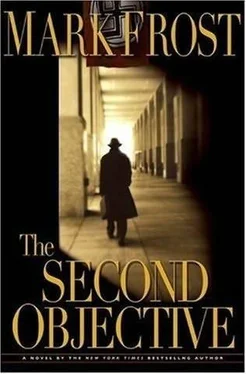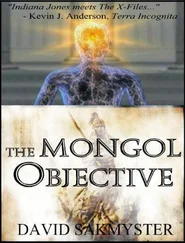Von Leinsdorf fished around in his knapsack for traveling papers.
“I’ll do the talking,” he said.
Bernie honked the horn and flashed headlights as they drove up to the gate, alerting a middle-aged French soldier, who stepped out to meet them. Von Leinsdorf waved the transit papers at the man as he emerged, and spoke in rapid-fire French. When the soldier asked for a password, Von Leinsdorf lit into him. Bernie didn’t understand a word, but it was clear that hearing fluent French from an angry American officer unnerved the man.
Von Leinsdorf held up his dispatch case. “Je porte les expéditions importantes pour le chef du personnel Américain .”
Von Leinsdorf jumped out of the jeep, red in the face, using names that Bernie didn’t need translation to understand. Cringing and apologetic, the Frenchman indicated he needed to show their papers to his superior inside.
“Wait here,” Von Leinsdorf said to Bernie.
The sentry led him to their barracks, a squat concrete block house twenty yards behind the kiosk. The Frenchman continued to apologize, backpedaling, tripping over his own feet. Von Leinsdorf waved at him to keep walking and followed, reaching for something on his belt.
Bernie lit a cigarette and waited until the two men entered the block house, then climbed out of the jeep and hurried to the kiosk. He looked around for paper and pen, scribbled a note in English, until he saw the door of the block house open.
Von Leinsdorf walked out, carrying a basket and a bottle of wine. He saw Bernie in the kiosk, studying a sheet of paper next to the window.
“What are you doing in there?”
“Take a look. They changed passwords overnight,” said Bernie.
Von Leinsdorf scanned it, a telex from American command.
“Who’s ‘Dizzy Dean’?”
“He’s a pitcher, for the St. Louis Cardinals.”
“Well done, Brooklyn. You finally made a contribution.”
Von Leinsdorf headed for the jeep. As he followed, Bernie noticed a body lying in the doorway of the block house.
“At least the fucking Frogs know how to eat,” said Von Leinsdorf, handing him the basket. “Let’s get moving.”
Bernie pointed to his cheek as Von Leinsdorf climbed back in beside him.
“What?” said Von Leinsdorf, then wiped his cheek. A spot of blood came off on his hand. “Did I get it?”
Bernie nodded, and started the jeep as Von Leinsdorf took the basket and rummaged through it.
“Not exactly Christmas dinner, but it’ll do. Fruit and cheese, a baguette. Guess they already ate the foie gras,” said Von Leinsdorf. “First time in France, Brooklyn?”
“Yeah.”
“Beautiful country,” said Von Leinsdorf, biting into an apple. “Dreadful people.”
A phone began to ring inside the kiosk as they drove away.
The Border Crossing at Givet
DECEMBER 19, 6:00 A.M.
The burned hulk of the MPs’ jeep didn’t cool enough to be searched until halfway through the night. Searchlights were brought out illuminating the yard. Concern persisted that they’d killed four MPs until, near dawn, Earl Grannit turned up some burned German uniforms in a gas canister, and some of the same customized weapons they’d found in Karl Schmidt’s jeep. Ole Carlson called Grannit over to look at a still-smoldering scrap of paper he had picked from the debris.
“One of their SHAEF passes,” said Carlson.
The top had burned away, obliterating the word “headquarters.”
“The guard who cleared them said it was spelled right,” he said, troubled.
“Maybe he got it wrong,” said Grannit. “You did for a while, and you were staring at it.”
“I don’t know. Something about it’s bugging me.”
Grannit asked the captain in charge to make sure every other border post had up-to-date intel about the two men they were looking for. The captain showed Grannit a large map of the French-Belgian border on his office wall.
“There’s six crossings between here and the west edge of Luxembourg,” said the captain. “Unless they cross on foot.”
“They’ll go through a checkpoint,” said Grannit, studying the map. “They’re not going to give up their jeep. We hauled ass getting here; they can’t be that far ahead of us.”
“Our reinforcements are moving into Belgium along these roads,” said the captain. “They’ll probably stay in this corridor. That leaves four crossings.”
“You have MPs at all these posts?” asked Grannit.
“They were supposed to be there by this morning. We may not have reached all of ’em yet.”
One of the MPs working the phones came back to confirm that three crossings had received the bulletin, and that MPs had arrived during the night. No other German teams had been stopped. The second MP was still on the phone.
“What’s going on, son?” Grannit asked him.
“I can’t get through to Pont-Colin,” he said.
“Where’s that?”
“Small post, twenty miles south,” said the captain. “Used mostly by local traffic. Under French control.”
“Get me a map. Ole, bring your breakfast.”
The weather improved as Bernie drove out of the hills and made the last crossing over the Meuse as it twisted south through the high plains of northern France. Traffic on the highway from Reims was a solid flow of American military, all headed north, toward Belgium.
“What did you want to be when the war’s over, Brooklyn?”
“Alive.”
“Aside from that,” said Von Leinsdorf.
Bernie glanced over. With a full belly and an open road ahead, the mercurial German had drifted into an unguarded mood, the ugly threats he’d made forgotten. He angled back in his seat, one foot on the dash, hands behind his head, looking up at the overcast sky. Bernie decided to keep him talking.
“I was supposed to go to college,” said Bernie. “To figure that out.”
“Where?”
“I was thinking NYU. New York University. Maybe study engineering, something like that.”
“Yes, it would have suited you. Jolly good wheeze, campus life. I would have gone on to university in England, Cambridge, King’s College. That was the plan anyway.”
“Thought you’d always been in the army,” said Bernie.
“Before the war? No. Politics, diplomacy, that’s where I was headed. Peace between nations. Serving the greater good. That was my father’s influence.”
Bernie saw a shade of feeling flicker across his face.
“Where is he now?” asked Bernie.
“He died. Just after he retired.”
“What was he like?”
“A decent man. His talent fell short of his ambition. He needed work to have a reason to live.” Von Leinsdorf lit a cigarette, eager to shift the subject. “Is your father alive?”
“There’s been heavy bombing in Frankfurt. I haven’t heard from them.”
“Terrible thing to lose your father.”
Von Leinsdorf sounded genuine, as if he still possessed some trace of humanity.
“We were both taken from the life we were supposed to live, Brooklyn. Men our age should have more agreeable things on their minds. We should be out on the town, driving around with a couple of pretty girls.”
Bernie looked at him. “Which town?”
“Paris isn’t a bad place to start. Ever been?”
“No.”
“Maybe once we finish there, we’ll cruise down the Rivoli, pick up a couple of those fresh young things in their summer dresses. Champagne dinner at the Hotel Meurice, dancing, a midnight show in Pigalle. How does that sound?”
“Sounds pretty good.”
So we’re going to Paris. After Reims. That’s our destination. Now all I need is the target.
Von Leinsdorf glanced up again. “Looks like it might rain.”
“How many squads are working on this with us?” asked Bernie casually.
Читать дальше












